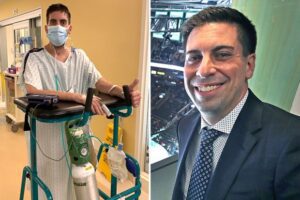Chris Snow, wife has shared that the Calgary Flames’ vice-president of data and analytics has experienced a severe brain injury following a cardiac arrest, and it is unlikely that he will recover.
Chris Snow, aged 42, was previously diagnosed with amyotrophic lateral sclerosis (ALS) in 2019.
Kelsie Snow took to social media on Wednesday to explain that her husband became unresponsive and suffered a heart attack on Tuesday. While paramedics and doctors were able to restart his heart, a lack of oxygen during the incident caused a significant brain injury. She added that medical professionals do not anticipate him waking up from this injury.


“My chest feels cracked open and hollowed out,” Kelsie Snow wrote. “Chris is the most beautiful, brilliant person I’ll ever know and doing life without him feels untenable.
“Hug your people.
ALS is a progressive nerve system condition that affects brain and spinal cord cells, leading to a loss of muscle control.
Tragically, Chris Snow has a family history of this disease, with his father, two uncles, and a cousin also succumbing to ALS. Lou Gehrig’s disease, as it is commonly known, affected the famous New York Yankee player, Lou Gehrig, who was diagnosed with it at the age of 36 and passed away in 1941.
Know More About Chris Snow Personal Life
Education
Hailing from Melrose, Massachusetts, Chris studied journalism and policy studies during his time at Syracuse University.
Career
Chris Snow initially worked as a baseball writer until the NHL’s Minnesota Wild hired him as their director of hockey operations in 2006. Later, in 2011, he joined the Flames as their director of hockey analysis when the Wild underwent changes.


In 2019, he was promoted to the role of Assistant General Manager (AGM) and primarily focused on data analysis.
Even after his ALS diagnosis, Chris Snow continued to work for the Flames. In May, he was appointed as the team’s vice-president of data and analytics, coinciding with Craig Conroy’s appointment as the new general manager of the club. Doctors initially told him he had only one year to live.
Parents
Chris Snow is the son of Bob Snow and Linda Snow. Tragically, in 2012, Chris Snow’s mother, Linda, passed away by suicide. His father, Bob Snow, who was a former schools assistant superintendent, also succumbed to the same disease.
Wife
Chris Snow is married to Kelsie Snow. They first met when they were working as sportswriters for The Boston Globe and later tied the knot in 2007.


Children
They have two children, Cohen and Willa.
Chris Snow’s Inspiring Journey: Thriving Beyond the 12-Month Prognosis
“It doesn’t seem right not have Snowy here with me,” a visibly emotional Conroy said Wednesday at a press conference to introduce new Flames captain Mikael Backlund.
“I was fortunate enough to bring Cohen. Little Snowy’s here, and that means more than you know.”
Chris Snow’s muscles were debilitated, and his capacity to speak and consume food was hindered by ALS.
“We cannot convey the impact Chris has on our organization, not only in his work but the leadership and positivity he brings,” the Flames said on social media. “Despite his own challenges, he is a beacon of light, uplifting all of us around him. Our hearts are with Kelsie, Cohen and Willa as Chris continues to battle.”


What is 4th stage ALS?
In the final stages of ALS, elderly patients may pass away due to respiratory difficulties, as they lose the ability to use their lung muscles effectively. Swelling in their airways during food ingestion can lead to choking, which can be life-threatening. Additionally, cardiac abnormalities may occur, potentially resulting in fatal cardiac arrests.
The precise origin of ALS remains incompletely comprehended, and there is currently no known remedy for this condition. ALS is categorized into two types: familial ALS, which is hereditary and constitutes roughly 5-10% of cases, and sporadic ALS, which arises without any familial precedent and comprises approximately 90-95% of cases.
Breathing problems are the main reason people with ALS pass away. About half of those with ALS don’t survive more than 14 to 18 months after being diagnosed. But there are some who live with ALS for a decade or even longer.
Regrettably, these nerves do not transmit pain signals to the brain. However, there are several factors contributing to pain in association with ALS-related weakness: Weakened muscles can exert additional stress on muscles and joints, frequently resulting in discomfort. This occurrence is most prevalent in the neck, shoulders, and back.












































